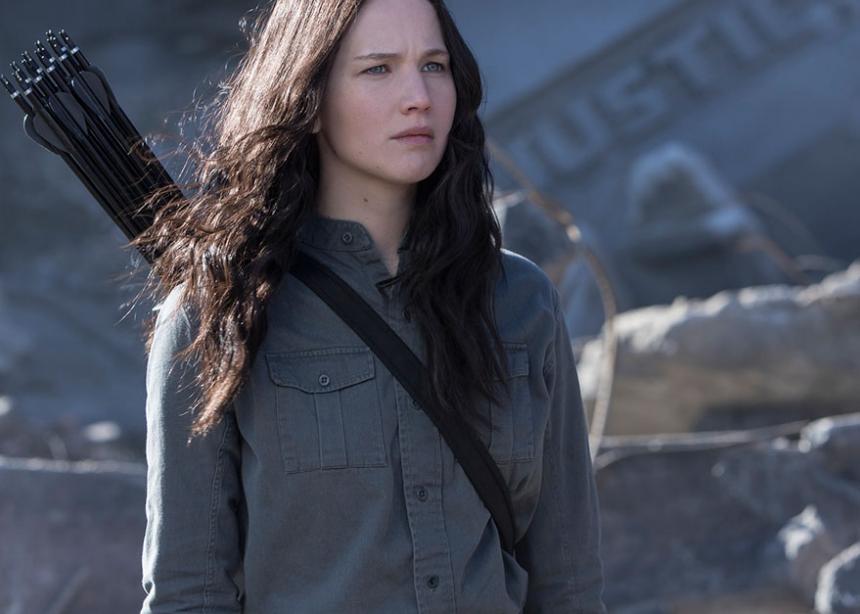Directed by Francis Lawrence. Screenwriters: Peter Craig and Danny Strong. Starring Jennifer Lawrence and Josh Hutcherson. A Color Force/Lionsgate release, 2014. Rated PG-13.
“Stop the senseless violence. This isn’t the path to change or justice.” According to the rebels in The Hunger Games: Mockingjay (Pt. 1), the third and weakest film in the Hunger Games series, those are words only a traitor would utter.
And indeed we soon learn that, although spoken by Peeta, one of the series’ heroes, the words actually come from the mouth of President Snow (Donald Sutherland), the representative of evil in the Hunger Games world.
As a follower of Jesus, I was immediately put on the defensive.
Mockingjay (Pt. 1) begins deep underground, where District 13—which was thought destroyed 75 years ago—has remained hidden while developing its computer technology and a huge arsenal of weapons to be used for a second attempt at revolution against the Capitol.
Plutarch Heavensbee (Philip Seymour Hoffman) convinces President Coin (Julianne Moore), that Katniss (Jennifer Lawrence) is the perfect symbol for the revolution and should be featured in a series of propaganda films that will inspire the other districts to join the fight. Katniss is reluctant until she sees what Snow has done to District 12, where her home is located. Meanwhile, Peeta has been forced to star in Snow’s own propaganda films and say such traitorous things to the rebels as “Stop the killing!”
The acting in Mockingjay (Pt. 1) is excellent, and the score by James Newton Howard is his best in the series, but the final book in Suzanne Collins’s trilogy should never have been broken up into two films. Not only are the motives suspect, but the result is a film that is too long and not compelling. Worst of all, on its own it conveys the messages that violence is the only path to justice and Jesus should be branded a coward and a traitor for not backing a violent revolt against Roman oppression.
History has shown that the myth of redemptive violence—the idea that the use of violence, however horrid it may be, is usually necessary to save the world from evil—only perpetuates the cycle of violence and has been singularly ineffective at ridding the world of evil. (After all, killing Sadam Hussein and Osama bin Laden has not made the world a peaceful place.)
Insofar as Mockingjay (Pt. 1) joins its countless Hollywood counterparts in promoting this myth, it suffers from a serious failure of the imagination. Yes, we need to stand against oppression, but, like Martin Luther King Jr., we need to find nonviolent ways of doing this that are both more effective and more faithful.
I recently visited the new Canadian Museum for Human Rights in Winnipeg and was appalled by the irony that led me from Buffy Sainte-Marie’s poignant anti-war classic, “Universal Soldier,” which suggests that soldiers are never the way to peace, to a temporary exhibit on peace which focusses on how Canadian military intervention in places like Afghanistan is a key way of creating peace. The ease with which we are able to sympathize with calls for a violent response to Islamic State is a direct result of propaganda like this. Exposing our children to such propaganda is something we do at our own peril.
Director Francis Lawrence says, “My goal with Mockingjay is to make people think about war—the sides of war, the consequences of it, the propaganda and the images we’re being shown.”
If that’s true, and I hope it is, his goal will only be achieved in the final film of the series, because Pt. 1 reveals nothing of this apart from ongoing reservations on the part of Katniss about her role in the revolution.
Indeed, the film’s use of “The Hanging Tree” song to goad the masses into violent action seems designed to create sympathy among viewers for the violence that follows. Given that the violence is aimed at the corporate powers that exploit the poor in our world, this is either very ironic or something to be resolved in a surprising plot twist in the fourth film.
See Vic Thiessen’s reviews of others in this series:





Add new comment
Canadian Mennonite invites comments and encourages constructive discussion about our content. Actual full names (first and last) are required. Comments are moderated and may be edited. They will not appear online until approved and will be posted during business hours. Some comments may be reproduced in print.